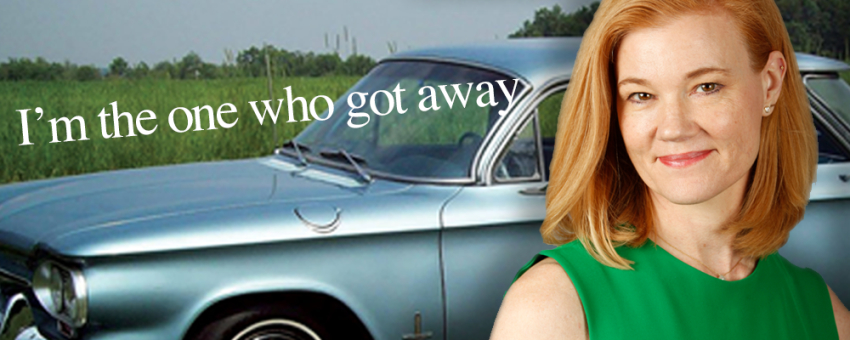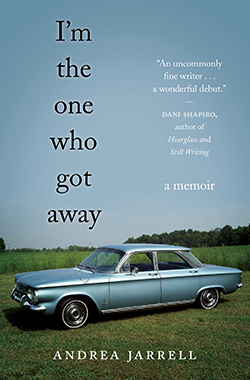Interview with Andrea Jarrell, Author of I’m the One Who Got Away


Memoirs can be some of the most compelling reading of all, and Jarrell’s I’m the One Who Got Away delivers in full as a beautifully written, captivating story. Foreword’s Ilyssa Wesche caught up with her for a conversation about writing, honesty in a family, and maintaining a sense of hope.
You cast your mother in a very sympathetic role, even though she chooses to go back to your abusive, albeit charming, father. Attending their second wedding must have been difficult. Did you tone down/edit out any feelings of anger in your book?
Yes, it was very hard at the time. I stewed in anger and resentment over this for years. And I think that the marriage section of the book does reveal my frustration over my mother’s return to him. But I’m not anguished about it anymore so I didn’t need to tone anything down. I think her actions were very human even if they had painful consequences. The book tries to delve into how we can make and rationalize such illogical choices.
Did your parents see your memoir before it was published? Did they have any input or request any edits? I’m thinking of your father, in particular, but your mother, too.
My mother had seen parts of it—earlier versions of some chapters that were published in places such as the New York Times Modern Love piece. But neither of my parents read the book before it was published. From the start my mother has been very supportive of me, my writing, and the book, but she was not sure she wanted to read it. She knew its content and helped fill in gaps and details for me but she didn’t know if it would be too painful to read. My father and I have a mended relationship but I was not looking for his approval of the book. When I talked to him about it shortly before it was released, he said he knew he “had done bad things” and that he was proud and happy for me about the book. He said, “I’ll be the first in line for an autographed copy.” I’ve been very lucky that both of my parents care more about me and my happiness than they do about their own egos.
The end of your book was hopeful in a way I didn’t expect, but very much appreciated. Why did you choose to end on such a hopeful note?
To me that hopefulness is really what the book is about. The takeaway to me is that no matter one’s beginnings, a fulfilling, safe, and happy life is possible. That hope is the meaning behind the title. My mother taught me not just to be buoyed by hope about a better future but also to work to make that future a reality. The constant in the book is her love, which has enabled me to make a good life for myself and to foster loving relationships with a partner, my children, and even my father.
How is it different to put your life out there in a memoir, as opposed to the essays you’ve written for The New York Times, the Washington Post, Rumpus?
That’s a really interesting question. Before the memoir came out I hadn’t understood how different it would feel. Obviously, a book is longer so readers are riding shotgun with you for a longer journey. But also, I think they just take a book more seriously. They dwell, consider, and analyze more deeply because the writer is telling this bigger story. As the writer, you have more life to own and make sense of. In an essay you can get in and out, infer, leave more untold and unexamined. So maybe the shorter answer is that in a memoir you expose more of yourself and that means both greater scrutiny but also deeper understanding on the part of readers. You allow yourself to be more known by the world.
As a reader and a Goodreads user, I review memoirs with trepidation. It’s hard to review a memoir without feeling like I’m reviewing a person’s life. Do you read your reviews on Goodreads or Amazon? (If not, how do you keep yourself from obsessively checking?)
That question makes me smile. I do check them pretty much daily. When I read them I bear in mind that the reviews are not for me; they are for readers. Even so, I open those windows on my computer with trepidation and a bit of a pounding chest. I also look at the ratings and reviews of other writers and books I love. This helps put my own reviews in perspective. I figure if someone isn’t as keen on my book as I’d like them to be, well, other readers didn’t love some other book I totally loved. My hope is that my book finds its people.
You’re in marketing. Did you do any of the marketing and promotion for your book? Was it harder or easier to do, since this project is yours? (The packaging, by the way, is beautiful. Nice trim size, great cover, good font. I’ve been in publishing for a long time, and in a bookstore before that. I’ve looked at a lot of books in my life—-people who think the package doesn’t matter are wrong.)
I really appreciate your comments about the cover and design. I totally agree on the importance of packaging. The kind of marketing I do is for colleges and universities so I definitely wanted a PR partner with expertise in the book world. We’ve made a good team because we speak the same language. I can frame up marketing hooks that my publicists build on. Or they have pitch ideas that I can deliver on in terms of new essays, interviews, or events. In that way the synergy has been really fun. The marketer in me also knows how to be realistic rather than entitled about coverage. I figure if I am as helpful as I can be not only to my publicity team but also to editors, bookstores, bloggers, other writers, and readers who reach out to me then I’ve done what I can do.
Are you working on another book yet?
I am. I can’t really say more than that at the moment. Only that I’ve definitely got my eye on what’s next.
Matt Sutherland
